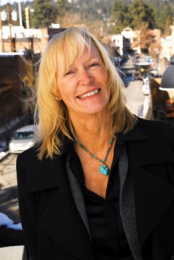 As this issue Cascade Business News is put to bed staff and business supporters will be preparing for the newspaper’s 15th Birthday Party on September 16. A lot of circumstances have changed the course of the Central Oregon economic climate over the past 15 years.
As this issue Cascade Business News is put to bed staff and business supporters will be preparing for the newspaper’s 15th Birthday Party on September 16. A lot of circumstances have changed the course of the Central Oregon economic climate over the past 15 years.
On September 19, 2001 we wrote: America is Open for Business —Only it’s Not as Usual in response to the horrific attack on our country on 9/11. We ran a story about the devastating collapse of the World Trade Center and the impact on Morgan Stanley. I wrote “many businesses have been impacted but will reopen in new locations. Life will go on. The economy will prosper. But it will never be the same during our lifetime.” Sadly I was right in more ways than one — only today we’re now waiting for the economy to prosper again.
Security in this country has taken a complete reversal of previous cautions: impacting the manufacturing, technology and services industries. More jobs have become available for security personnel who must be highly trained experts in their field.
Congress has allocated huge amounts of money for security improvements, safety measures and, of course, military retaliation. However, on September 19, 2001, we had no idea that we were headed for war in March 2003.
On September 18, 2002 the CBN Editorial praised small businesses: It’s impossible to provide an exact count, but there are approximately 14,000 small businesses operating in Central Oregon. These companies make up the backbone of the region’s economy. From the smallest retailer and the restaurateurs to the financial planners and the construction companies — they provide jobs for thousands of Central Oregonians and a comfortable living for their families.
It’s not easy owning and operating a small business. Long hours, lots of competition and the ongoing frustrations of managing employees, keeping up with rising costs in goods, taxes, healthcare and more keep the small business owner constantly on their toes.
But the rewards are great, knowing that you’ve worked hard to develop your own business, providing jobs for your employees, being your own boss, keeping your customers happy and being an important contributor to your community. In today’s economy working hard is an understatement.
On September 17, 2003 we wrote about the B&B Fire near Sisters. “It will break your heart to drive past Sisters on Highway 20. If the smoke, the financial impact, the firefighters working day and night or the news of the fires in the media didn’t get your attention, the blackened earth and the charred trees will certainly give you pause.
It’s hard enough to get the state and the nation to get an understanding of the widespread impact. And then, along comes Blue Mountain Biodiversity Project. In the mist of the fires, this group appealed the Metolius Basin project, which was planned to be a large-scale thinning and restoration program on approximately 12,000 acres in the Deschutes National Forest near Sisters (an area that was not burned during the B&B Fires).
The project is exactly the kind of treatment that can help quell the mounting danger of fires like the one near Sisters.
On September 1, 2004 the editorial read: Help is Not on the Way referring to Congress’s inability to support the simplest legislation that would allow small businesses to join together to allow associations to offer health insurance to their small business members through Small-Business Health Plans.
And why? It’s basically political. Insurance companies don’t want this to happen and lobby congressional delegates heavily, delaying a vote on the legislation. No much has changed since then, has it?
On September 21, 2005 were were celebrating our 12th birthday: You might say that this company is a poster child for a small business: creating it, launching it, keeping it, growing it — all done with a cadre of hardworking and talented staff, supportive business environment (we were in the right place at the right time) and loyal customers. All done in Central Oregon where we have been more than fortunate to have such a positive economic climate. Might we wish for 2005 again?
On September 20, 2006 we wrote about the real estate market being soft. Houses were not being purchased as quickly in Bend realtors told us. However, Central Oregon housing prices continued to soar through the year, defying national trends keeping the region on the spotlight in national news. Positive national news.
A Federal Housing report based on 2nd Quarter home sales in 2006 rated Bend as the top appreciating market in the U.S. This report showed Bend prices continuing to rise at 36.65 percent over the past 12 months, compared to 4.68 percent nationwide.
On the commercial side, vacancy rates looked good, according to the Market Summary prepared by Compass Commercial Real Estate Services.
And today despite the flat-lining economy, more houses have been sold in Central Oregon through August of this year than in the same period for 2008, but many of these homes are short sales and foreclosures. And even though local real estate brokers say the market has yet to hit bottom many observers say now is the time to buy, especially for first-time buyers. No longer is Bend at the top of its game, we clearly have had a big hammer come down on our real estate market in a very short period of time.
On September 19, 2007 we lamented how the City of Bend put in force a rather dramatic increase in building fees, especially in light of the current building and real estate correction. The whopping 35 percent increase was based on the city’s need to fund its $480 million budget. Central Oregon Builders Association felt that the increase is unjustifiably large possibly produced by the city’s overestimation of future permits numbers. The rates also did not match increases in other areas of Central Oregon.
While all of Central Oregon has benefited by the healthy amount of construction projects, this is not a time to gouge developers and builders over building fees. Any turn in the real estate market will have a negative impact and the City of Bend’s actions should not have a damaging impact on the local economy.
On September 18, 2008 we asked How did Lipstick Become a Cover Up? We were in the middle of a presidential election: You can put lipstick on a pig and it will still be a pig — quoted both John McCain and Barack Obama in recent campaign speeches. That one line was the center of controversy for days last week as viewers watched both sides accuse the other of insulting Sarah Palin and/or Hillary Clinton. The truth was that both candidates were referring to the opposing side’s economic and health plans. However, it seemed no one really cared about the issues, they’d rather talk about pigs and lipstick.
How in the world did anything so absolutely insane become the focus of the presidential election — when the economy was struggling, a war was still going on, we were facing huge deficits, the real estate market was stressed, gas prices were sky rocketing and the majority of Americans don’t have adequate healthcare?
And here we are today, same issues, some different faces. But the economy still sucks and Bill Watkins, executive director of Center for Economic Research and Forecasting at Cal-Lutheran, says he doesn’t believe that sustained growth will occur any time soon. He said we may see small positive growth this quarter and the media will declare the recession over. However, the stimulus plan is not working. Government spending does not improve the productivity of private capital. Banks are still not lending. Houses, especially in Central Oregon, are selling for less than you can build them.
That said, we end this editorial with this: go ahead and declare the recession over. It’s not likely that there’s anything more that we can do to help the economy than to believe that it’s getting better and continue to operate our businesses lean and efficient and hold out for a recovery to eventually happen. If our community can lift itself up from the gloom and find some light even in the smallest of economic improvements, then that’s a very good thing. Let’s get this party started.


